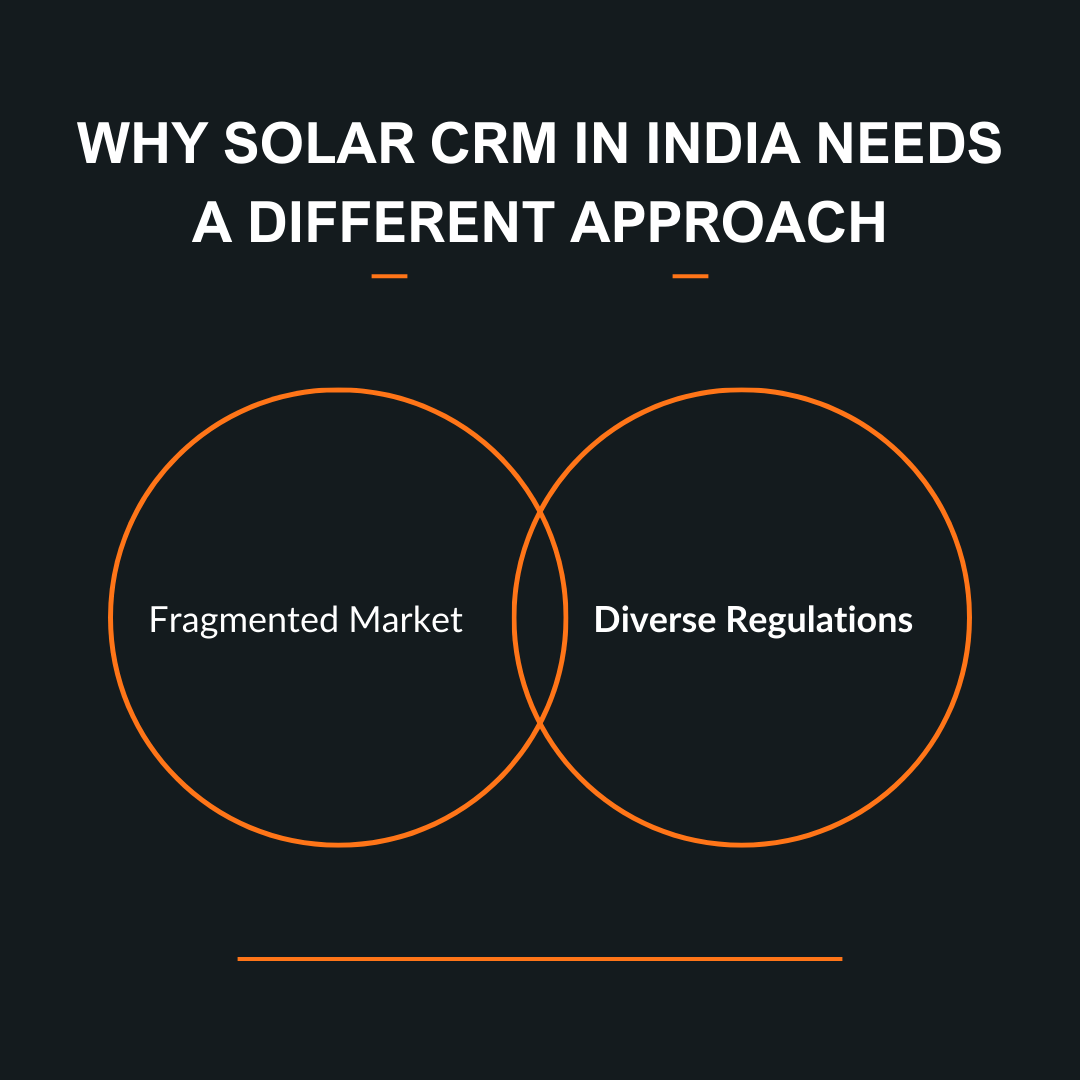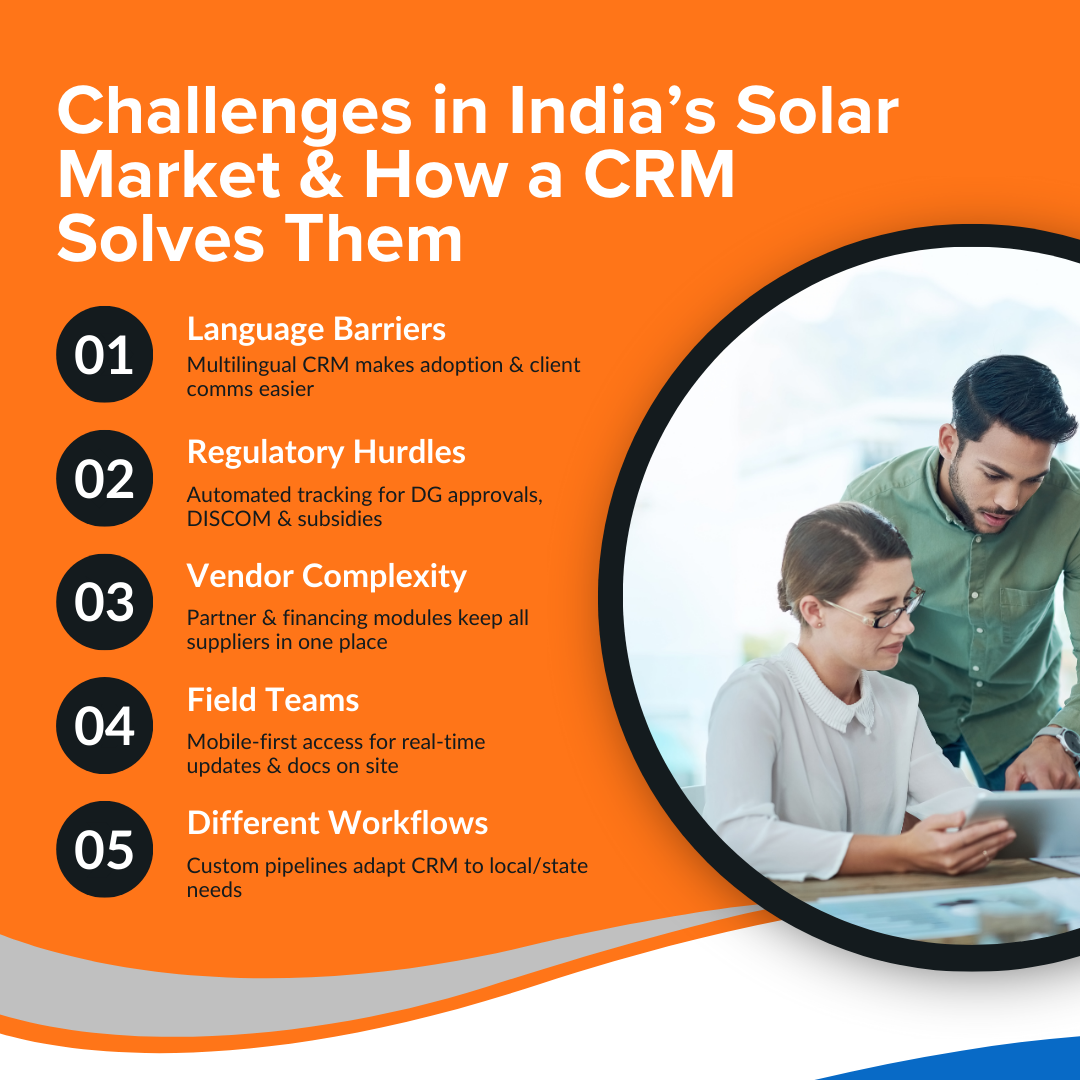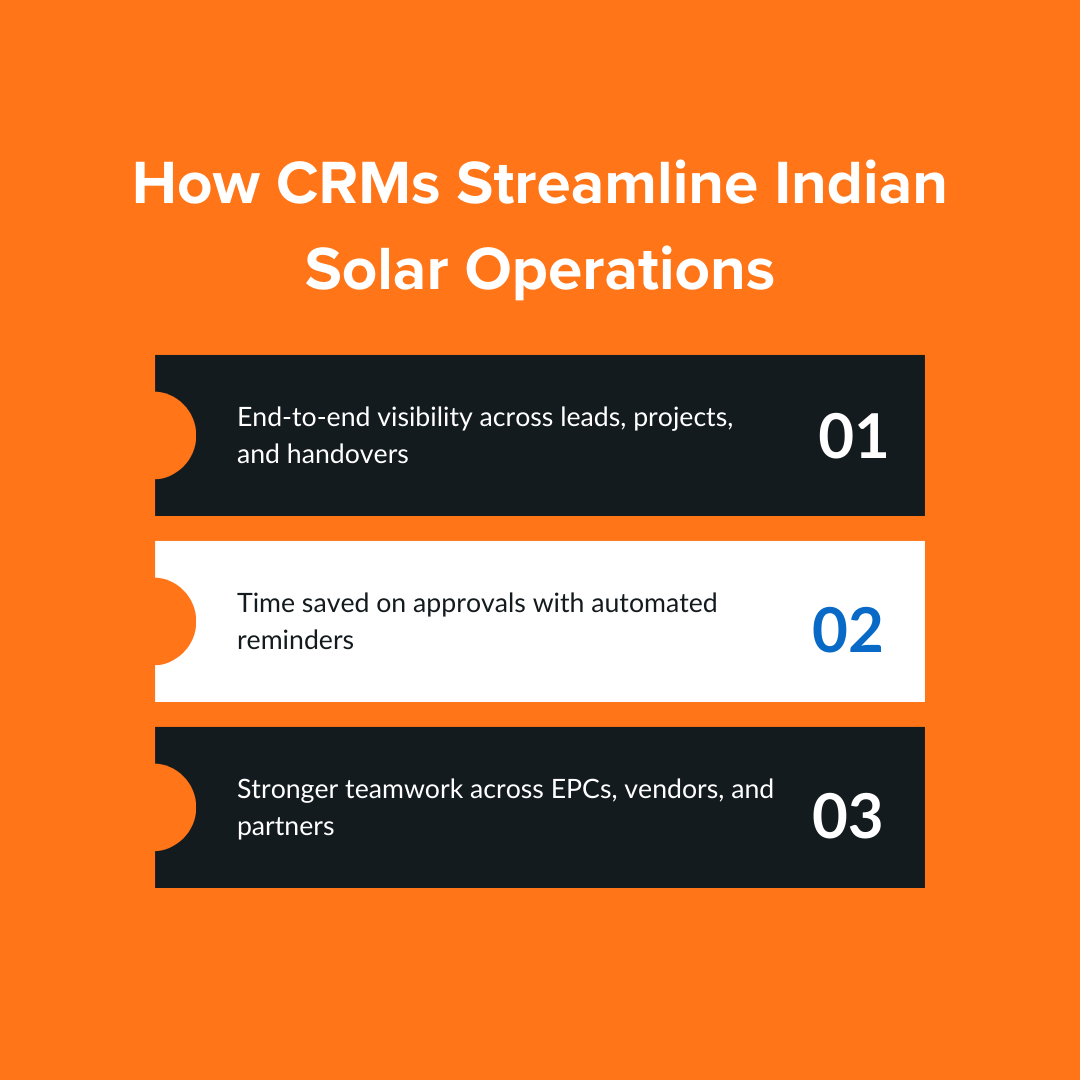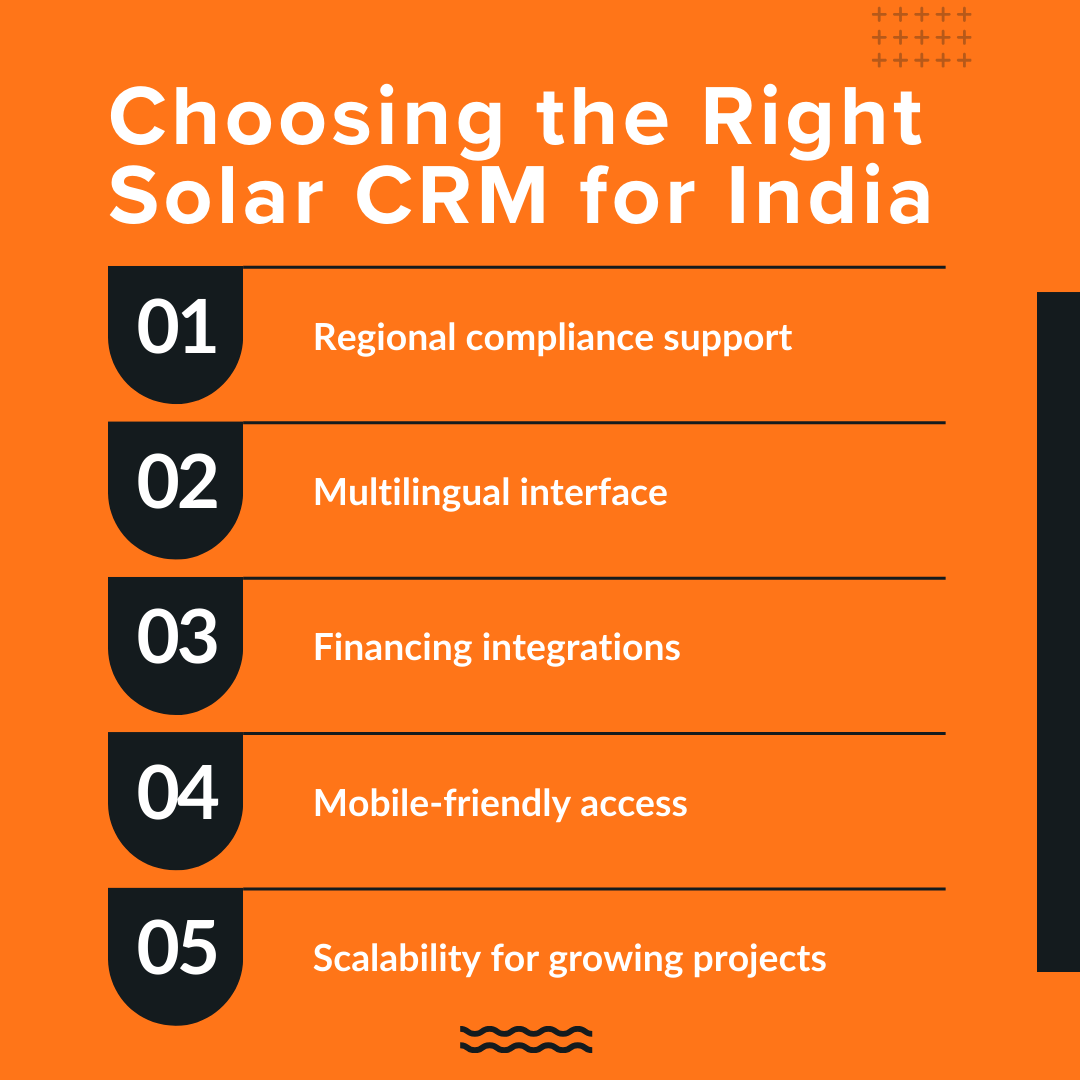October 9, 2025
Audio overview: Listen & Learn
Solar energy is taking off in India like never before. But if you’re running a solar business here, you know it’s not always smooth sailing.
Every state has its own rules; the paperwork for DG approvals and subsidies can drag on forever, and managing projects across different regions (and languages) is its own challenge.
That’s why more companies are turning to Solar CRM software built for India. The right CRM can help you cut through approval delays, stay on top of compliance, and keep your teams connected, no matter where they’re working. In a market this complex, this kind of support can make all the difference.
Solar CRM India: Meeting Local Needs and Challenges
A few big corporations don’t run India’s solar space, but thousands of small and mid-sized players power it. This diversity creates both opportunity and complexity, and it’s where a tailored solar CRM can make a real difference.
Key Takeaways
- India’s solar market is fragmented, with countless small and regional players.
- Regulations and workflows vary widely across states, adding complexity.
- Generic CRMs often overlook local needs, such as partner management and supply chain gaps.
- A CRM built for India helps businesses stay compliant and scale faster.
Why Solar CRM in India Needs a Different Approach

The growth of the solar industry in India comes with its own quirks. From how businesses are structured to the way approvals work, local challenges mean CRMs can’t simply copy-paste global models. They need adjustments to really fit.
1. Fragmented Market
Most of India’s solar growth is driven by smaller players like EPC firms, regional installers, and local suppliers, making coordination harder.
A CRM that can organize vendors, track progress across multiple projects, and bring everything into one place helps businesses stay in control without extra overhead.
2. Diverse Regulations
Policies don’t look the same across states. Net metering rules, subsidy processes, and DG approvals can all change depending on where you’re operating.
A CRM with built-in flexibility makes it easier to handle these variations, so companies can move projects forward without getting tangled in red tape.
Challenges in India’s Solar Market and How a CRM Solves Them

From language barriers to shifting policies and a complex partner network, here are the challenges a CRM must solve to truly work in the Indian market.
1. Multilingual Workforce and Clients
The challenge: Solar adoption is booming in tier-2 and tier-3 cities, where staff and customers may be more comfortable in Hindi or regional languages than English. Without support for local languages, teams struggle to use software effectively.
The solution: A CRM with a multilingual interface makes adoption smoother, reduces training time, and helps businesses connect with clients in the language they trust.
2. Diverse Regulatory Landscape
The challenge: DG approvals, DISCOM rules, and subsidy paperwork vary widely from state to state, creating delays and errors.
The solution: A CRM that automates compliance workflows, tracking submissions, sending reminders, and flagging issues, saves weeks of back-and-forth and keeps projects on track.
3. Fragmented Vendor and Partner Ecosystem
The challenge: Solar companies often work with a patchwork of local suppliers, financing partners, and installers. Coordinating all of them without a central system can quickly turn messy.
The solution: A CRM with vendor and financing management modules keeps every partner visible in one place, making coordination easier and reducing costly miscommunication.
4. Field-Heavy Operations
The challenge: Most solar teams, sales reps, installers, and surveyors work in the field, not behind desks. Without mobile access, updates are delayed and communication breaks down.
The solution: A mobile-first CRM lets staff update project status, upload documents, or pull client details right from their phones, keeping everyone aligned in real time.
5. No Standard Workflows
The challenge: Each state, company, and team works a little differently. A rigid, one-size-fits-all CRM often causes more frustration than efficiency.
The solution: A CRM with customizable workflows adapts to local needs, whether it’s handling state-specific approvals or unique team structures, so businesses don’t have to bend their process to fit the software.
Also read: 5 Sales CRM Features Every Solar Company Needs in 2025
How CRMs Streamline Indian Solar Operations

A good solar CRM changes how the entire business operates on a day-to-day basis. In India’s fast-moving solar market, that shift shows up in three big ways:
- End-to-end visibility: From the first lead to final project handover, everything sits in one system. That means fewer blind spots and faster responses when clients ask for updates.
- Time saved on approvals: Automated reminders for DISCOM applications or subsidy documents keep projects moving without staff chasing paperwork. What used to take weeks of follow-ups can often be cut down to days.
- Stronger teamwork: EPCs, vendors, and financing partners all work off the same information. That reduces errors, avoids duplicate work, and keeps everyone on the same page, even when they’re spread across different regions.
For example, imagine a solar EPC in Rajasthan handling projects in both Jaipur and Jodhpur. With a CRM, the sales team can track leads, the operations team gets automatic alerts when DG approvals are due, and vendors see real-time updates on equipment delivery. Instead of endless calls and WhatsApp groups, everything flows through one system, making the handover to the client smooth and stress-free.
Check out: Scaling Smart: Growth Strategies for Solar Businesses
Choosing the Right Solar CRM for India

With so many software options out there, picking the right CRM can feel overwhelming. The trick is to focus on whether the tool is built for India’s realities, not just generic features. Here are a few questions to ask before deciding:
- Does it support regional compliance?
Look for approval and subsidy tracking that actually works with your state’s rules. - Can it handle multiple languages?
A multilingual interface makes adoption easier for teams in Tier 2 and Tier 3 cities. - Does it integrate with financing options?
Since many solar projects rely on loans or subsidies, built-in financing modules are a must. - Is it mobile-friendly?
Field teams need access on the go; desktop-only tools won’t cut it. - Will it scale with my business?
Choose a CRM flexible enough to grow with you as projects get bigger and more complex.
When you’re evaluating tools, look for a CRM that’s designed for India’s unique solar challenges, not just a generic system with a few add-ons.
Platforms like Sunbase are built with these realities in mind, making it easier to run projects smoothly from start to finish.
Conclusion
India’s solar market is full of opportunity, but it also comes with unique challenges. The right CRM can handle approvals, vendors, and everyday coordination, allowing your team to spend less time chasing paperwork and more time growing the business.
Choose a system that suits your workflow, and you’ll be ready to scale with confidence.
Ready to Simplify Solar Operations with Sunbase?
Sunbase is built with India’s solar market in mind. If you’re ready to cut delays, keep projects on track, and scale faster, it’s time to see how Sunbase can work for you.
Book a demo today! See how easy it can be!
FAQs
1. Why can’t I use a generic CRM for my solar business in India?
Generic CRMs often don’t account for India’s state-level rules, DG approvals, or subsidy processes. A solar-specific CRM like Sunbase is designed to handle these local needs.
2. How does a solar CRM help with compliance?
It can track approval workflows, send reminders for DISCOM or DG applications, and reduce errors in subsidy paperwork.
3. Is a solar CRM useful for smaller EPCs or only for large companies?
Both. For smaller firms, it maintains organized and professional operations. For larger ones, it streamlines communication across bigger teams and multiple regions.
I agree to receive marketing messaging from Sunbase at the phone number provided above. I understand data rates will apply, and can reply STOP to OPT OUT.







